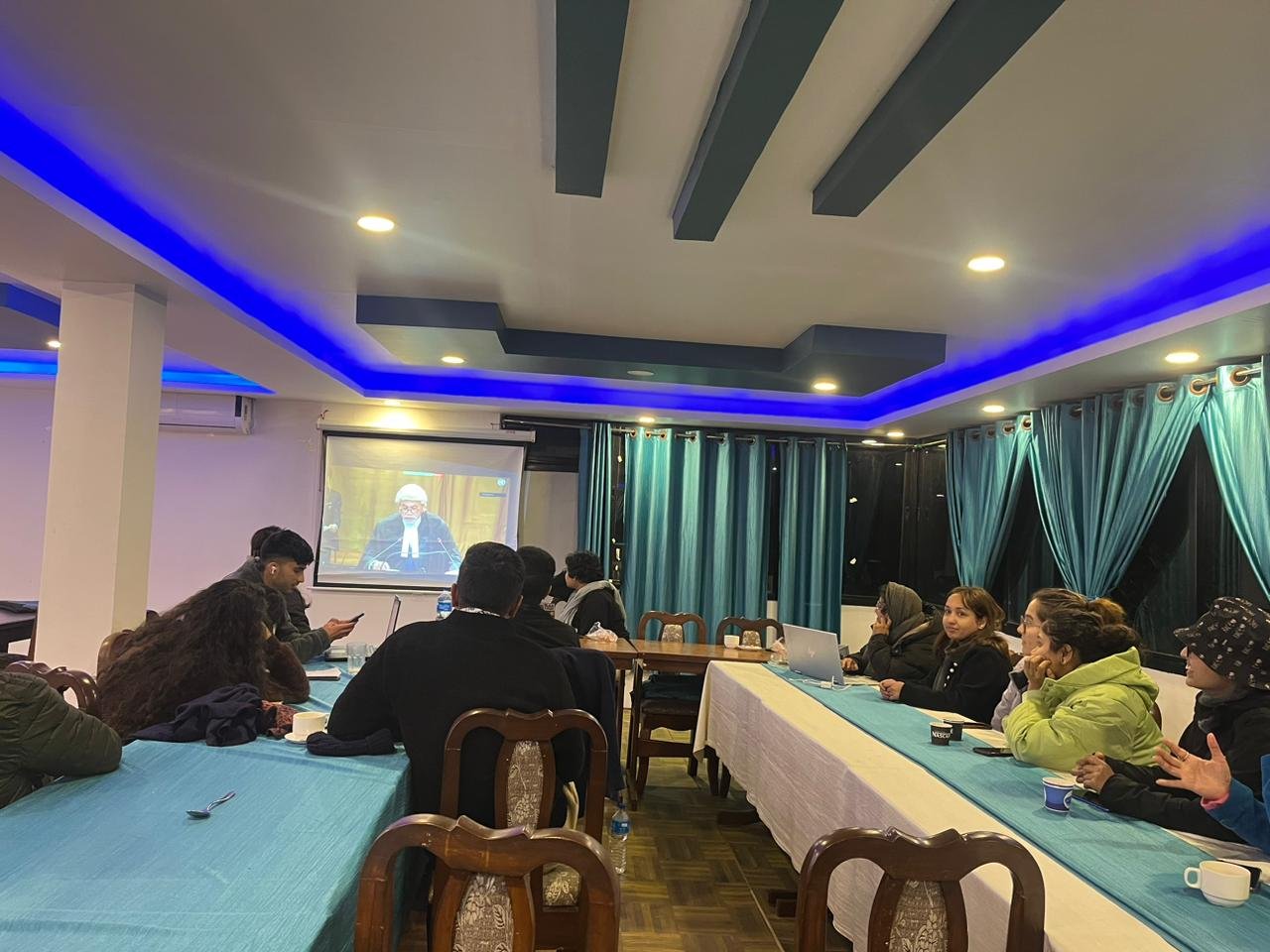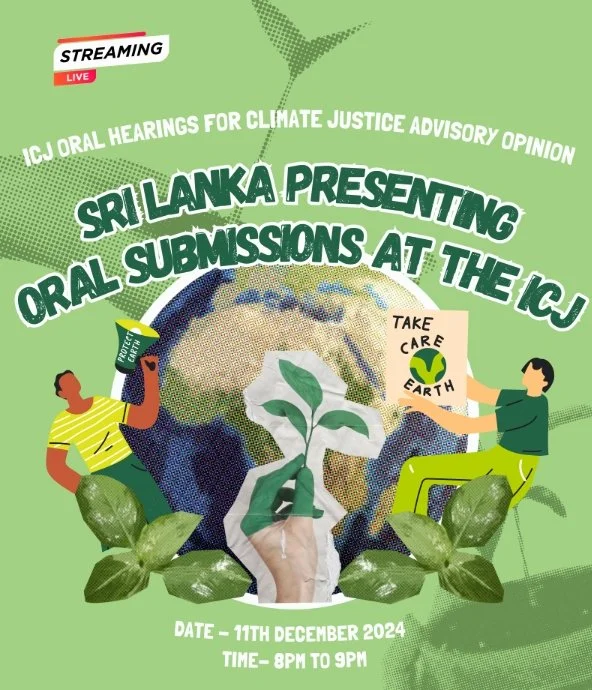ICJAO Watch Parties: WYCJ Asia Front
Watch party with the Bhutan Front.
Vanuatu is one of the island nations bearing the serious brunt of climate change. With least contribution to climate change, the catastrophes suffered are utterly disproportionate. Known for its natural beauty and unique cultural heritage, Vanuatu is a beautiful nation exposed to the vulnerabilities of climate change. As mentioned by the representatives, Vanuatu is one of those countries most at risk from climate change, facing rising sea levels, cyclones, and environmental degradation, which threaten the physical survival, self-determination, and cultural heritage of its people — the Melanesians.
The state of Vanuatu reminds no less of Bhutan. Its pristine forests and snow capped mountains, often considered the asset of Bhutan. The serene environment and prideful peaks contribute to the two major economies of the country, tourism and hydropower. Bhutan is claimed to be one of the few carbon-neutral countries in the world offsetting more carbon than it emits. Yet, the brunt of climate change affects indiscriminately. Bhutan experienced two glacial lake outburst floods which claimed several lives and impacted several households. Similar to Vanuatu, climate change posed existential threat to a landlocked country like Bhutan.
The Intergovernmental Panel on Climate Change’s (IPCC) states that “Vulnerable communities who have historically contributed the least to current climate change are disproportionately affected.”
Some of the General Principles of International Law highlighted by the Representatives of the Government of Vanuatu are: the right to Self-determination, prevention of harm principle, Principle of Due Diligence, and Intergenerational equity. The narratives of the Government of Vanuatu bring to light the catastrophic impacts of climate change concurrent with the real time. The submission also addressed that impacts of Climate Change have been caused by certain states and they are in breach of international obligations. Thus, the crisis of climate change is attributable to these states for causing climate change and its consequential harm and must be held responsible.
The Right to Self-determination, mentioned in the United Nations Charter (1945), International Covenant on Civil and Political Rights (ICCPR, 1976), and International Covenant on Economic, Social and Cultural Rights (ICESCR, 1976) provides the right of people to determine their political status, govern themselves, and pursue their economic, social, and cultural development without external interference. The Melanesian spearhead group representative submitted that their people are in a great threat of losing their political state and might not even survive the impacts of the Climate Change.
Professor Jorge E Vinuales highlighted the numerous cases including Alabama claims arbitration in Trail Smelter Arbitration to Corfu Channel, Advisory Opinions on Legality of Nuclear Weapons and subsequent decision of the Court has recognized due diligence and prevention as the core requirement of state conduct. The Professor quoted a 1966 affirmation of the Court in Legality of the Threat or Use of Nuclear Weapons, “The existence of the general obligation of States to ensure that activities within their jurisdiction and control respect the environment of other States or of areas beyond national control is now part of the corpus of international law relating to the environment.” The professor emphasized the obligation of the States to prevent environmental harms. His submission also touches upon the due diligence of the States in its activities and preventing transboundary harms. The professor brought to light how the greenhouse gas producing States are doing the exact opposite of the due diligence and prevention principle obligated on them, simply providing lip service to their climate commitments. The climate crisis is attributable to major emitter States and this amounts to violation of international obligations of due diligence.
The principle of intergenerational equity states that every generation holds the Earth in common with members of the present generation and with other generations, past and future. The submission highlights a very important International Law Principle by the representative of the youth at the great hall of justice.
Professor Margarita submitted that the States that breach or violate the international obligations must be held responsible under Articles on State Responsibility. The professor submitted that certain States by acts and omission have caused significant harm to the climate system and other parts of the environment have breached international law. Her submission sought the Court to recognize these breaches and in accordance with the Articles on State Responsibility seize these acts and omissions that contribute to climate and environmental crisis. The Court must also ensure the non-repetition of the harmful contributions that aggravate the harms. Professor Margarita also highlighted the reparation for the catastrophes. Professor stated, “The responsibility for reparation must be proportionate to historic contributions to the harm.” Restitution is a primary form of reparation where the ecosystems can be restored to some extent. She also submitted for monetary compensation which must be provided for irreparable harms from the consequence of the climate crisis.
The Government of Vanuatu sought recognition from the Court that the conduct of certain states has caused immense harm to the people of Vanuatu and other vulnerable countries which is a violation of the international law and international legal norms. Consequently, these conducts must cease and ask for reparation of harms. The Vanuatu Government also pleaded that the domestic legal remedies are unable to address the crisis of climate change. The lives of their Vanuatuan people and so many more are at stake. This resonated generally and specifically to the concerns of Bhutanese people and the younger generation who are in constant fear of getting deprived of full enjoyment of our rights. The professor stated, “The law of State Responsibility serves as International Law’s foundation. It ensures that no State is above the law, that violations have consequences, that rights do indeed come with remedies for victims.”
The International Court of Justice (ICJ) holds a unique position as the principal judicial organ of the United Nations, tasked with upholding the rule of law on matters of global significance. In the context of climate change, the ICJ’s role extends beyond resolving disputes to providing authoritative guidance on state responsibilities under international law. The world looks to the ICJ to affirm that no state is above the law and that obligations to prevent and remedy environmental harm are binding. By clarifying the legal consequences of actions contributing to climate change, the ICJ can strengthen accountability mechanisms, set global precedents for addressing environmental crises, and reaffirm principles of equity, justice, and intergenerational responsibility. Ultimately, the Court’s decision has the potential to inspire collective action, foster international cooperation, and renew hope in the effectiveness of international law as a tool to confront humanity’s most pressing challenges.






